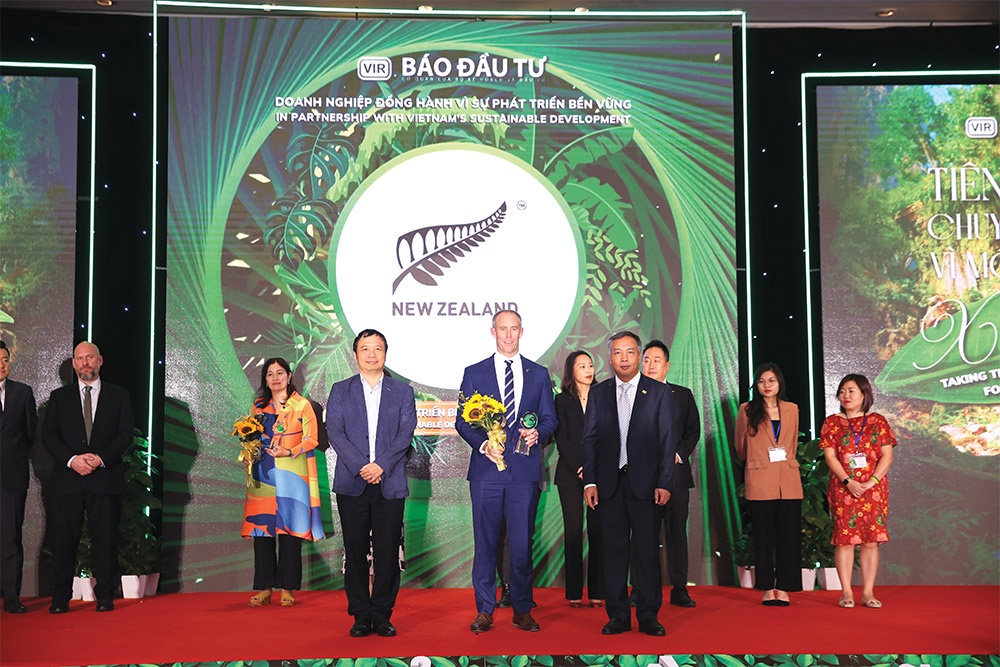Vietnam and New Zealand look to a sustainable future
New Zealand’s identity is inseparably linked to its landscape. From green rolling hills to our breathtaking coastlines, our environment is not just a part of who we are. It is integral to our economy, our culture, and our way of life. Sustainability is about safeguarding this environment for future generations while nurturing the growth of our industries and ensuring that our economic success does not come at the cost of the planet.
This includes our agriculture industry, which has a significant impact on our emissions profile, like Vietnam, New Zealand has committed to achieving net-zero carbon emissions by 2050. By investing in research and technology, we are working towards more efficient, lower-emission farming practices, which aim to balance productivity with environmental responsibility.
Our dedication to renewable energy is another area where New Zealand demonstrates its commitment to sustainability. Around 80 per cent of New Zealand’s electricity already comes from renewable sources, and we aim to increase this share to 100 per cent by 2030.
Additionally, our food and fibre sector is investing in technology to improve traceability and transparency. Digital tools are being used to track products from farm to table, building consumer trust but also driving accountability for sustainable practices throughout the supply chain.
 |
| Vietnam and New Zealand look to a sustainable future, Photo Dung Minh |
New Zealand actively supports our businesses to make sustainability a core part of their export strategy and a point of difference in global markets. This is especially important as more than 85 per cent of New Zealand’s exports are going to countries with environmental, social, and governance legislation in place or coming into force that require business to report on sustainability practices.
Firstly, companies must understand what their consumers want and clarify their objectives within the sustainability space. What specific goals are they aiming to achieve in this area? Secondly, collaboration is key. In New Zealand, businesses work together to share best practices, allowing others to benefit from collective knowledge and skills.
Finally, transparency is crucial. New Zealand consumers, for example, increasingly value transparency in sustainability efforts. This is something we have seen in companies like Boring Oat Milk, T&G, and Zespri. They do not want greenwashing; they want to understand the company’s true journey towards sustainability.
Sustainability sits at the heart of Boring Oat Milk where local supply chains are prioritised, and they offer recyclable packaging solutions for their customers.
To produce one litre of oat milk requires 70 per cent less land and creates 93 per cent less greenhouse gas emissions than one litre of dairy milk. With dairy a backbone of the New Zealand economy, Boring are looking at how an oat production system could fit into a regenerative farming framework while giving consumers choice.
Some of the steps T&G is taking include applying a completely environmentally friendly and ecologically safe growing process, adopting compostable labels, a 5 per cent reduction in the company’s emissions.
While kiwifruit is a low-impact crop, Zespri knows there are still environmental impacts involved in growing and delivering the fruit to consumers. The company is utilising new tools and technology to reduce its environmental impact from the kiwifruit grower to the end consumer.
New Zealand is committed to a vision of sustainability that reflects who we are as a people. From our government policies to our industry practices, we are working to protect our natural resources, promote social equity, and support the wellbeing of our communities as we work towards net-zero 2050. Sustainability for us means creating a future where economic growth, environmental health, and societal wellbeing are interconnected and mutually reinforcing.
I see plenty of opportunities for New Zealand and Vietnamese businesses to collaborate. New Zealand is already significantly involved in Vietnam, particularly through funding initiatives that enhance sustainable development in the agriculture sector. There is great potential for resource sharing and support, and as more New Zealand businesses engage with Vietnam, it will be increasingly important for them to work together in developing a roadmap for sustainable business.
New Zealand and Vietnam are already collaborating closely and will continue to grow these business connections. A shared vision for sustainable goals is essential, with a clear roadmap for cooperation and knowledge exchange. By collaborating and sharing best practices, businesses in both countries can move forward together. Sustainability isn’t about one company outperforming others; we need everyone to succeed in this area for meaningful progress.
 | New Zealand and Vietnam to strengthen ties New Zealand and Vietnam are focused on strengthening cooperation by making progress on mutually beneficial opportunities. |
 | New Zealand shares sustainable development experience with Vietnam With its commitment to environmental preservation reflected in both policy and practice, New Zealand hopes its experiences can provide guidance for Vietnam's shift to a greener economy. |
(*)Scott James, New Zealand’s consul-general and trade commissioner to Vietnam
What the stars mean:
★ Poor ★ ★ Promising ★★★ Good ★★★★ Very good ★★★★★ Exceptional
Related Contents
Latest News
More News
- Vingroup consults on carbon credits for electric vehicle charging network (January 28, 2026 | 11:04)
- Bac Ai Pumped Storage Hydropower Plant to enter peak construction phase (January 27, 2026 | 08:00)
- ASEAN could scale up sustainable aviation fuel by 2050 (January 24, 2026 | 10:19)
- 64,000 hectares of sea allocated for offshore wind surveys (January 22, 2026 | 20:23)
- EVN secures financing for Quang Trach II LNG power plant (January 17, 2026 | 15:55)
- PC1 teams up with DENZAI on regional wind projects (January 16, 2026 | 21:18)
- Innovation and ESG practices drive green transition in the digital era (January 16, 2026 | 16:51)
- Bac Ai hydropower works stay on track despite holiday period (January 16, 2026 | 16:19)
- Fugro extends MoU with PTSC G&S to support offshore wind growth (January 14, 2026 | 15:59)
- Pacifico Energy starts commercial operations at Sunpro Wind Farm in Mekong Delta (January 12, 2026 | 14:01)

 Tag:
Tag:




















 Mobile Version
Mobile Version